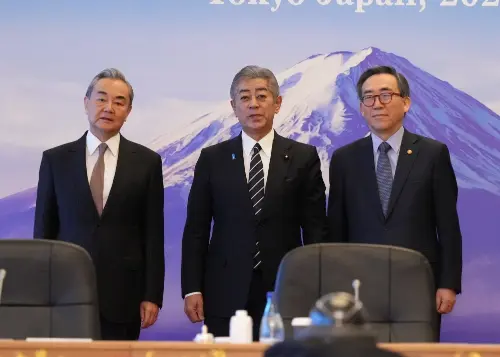The foreign ministers of Japan, China, and South Korea convened recently to address pressing regional challenges, including aging populations, declining birth rates, natural disasters, and the transition to a green economy. Amid rising global tensions and uncertainty, Japanese Foreign Minister Takeshi Iwaya, Chinese Foreign Minister Wang Yi, and South Korean Foreign Minister Cho Tae-yul emphasized the importance of fostering trilateral cooperation to tackle shared concerns over a changing world order and to bolster East Asian security and economic stability.
A central aspect of the meeting surrounded China’s concern over global chaos and a more hostile Trump administration. China seeks to strengthen ties with Japan and South Korea to counter the threat it perceives to be stemming from the West.
At the start of the meeting, Iwaya said: “Given the increasingly severe international situation, I believe we may truly be at a turning point in history.”
The discussions underscored a collective desire to bridge divides and build trust, even as deep-seated differences persist. Wang highlighted the trio’s combined strength – representing nearly 1.6 billion people and an economic output surpassing $24 trillion – arguing that their vast markets and potential could wield significant global influence. He called for resuming free trade negotiations with Japan and South Korea and expanding the 15-nation Regional Comprehensive Economic Partnership (RCEP), framing trilateral collaboration in technology and climate initiatives as a cornerstone of East Asian progress.
However, the meeting did not shy away from contentious issues. Japan and South Korea, both U.S. allies hosting American troops, expressed unease over China’s growing assertiveness, its military activities near Taiwan, its support for North Korea, and its backing of Russia in the Ukraine conflict. Iwaya reiterated Japan’s firm stance against unilateral attempts to alter the status quo by force and stressed the need for North Korea’s complete denuclearization under U.N. Security Council resolutions. He also condemned Russia’s war on Ukraine, reinforcing Tokyo’s alignment with Western partners.
Despite these frictions, the talks marked a step forward. Wang renewed China’s push for regional economic integration, proposing a trilateral economic framework and advocating for multilateralism and free trade to counter what he described as rising unilateralism and protectionism – likely a critique of U.S. President Donald Trump’s policies. The meeting laid the groundwork for a trilateral leaders’ summit later this year, a significant achievement for Japan given its historical and territorial disputes with both neighbors.
In a parallel development, Japan and China held their first high-level economic dialogue since April 2019, involving officials from multiple ministries. Progress was noted on lifting China’s ban on Japanese seafood imports, imposed after the 2023 Fukushima wastewater release, signaling a thaw in economic ties. Wang emphasized that expanding cooperation into new areas could strengthen the “comprehensive and mutually strategic” relationship between Tokyo and Beijing.
Meanwhile, Iwaya and Cho, in a separate bilateral meeting, reaffirmed their commitment to resolving issues with North Korea and enhancing trilateral cooperation with the United States amid global uncertainties. The broader context of U.S. policy under Trump, marked by tariffs and shifting alliances, loomed large, pushing these East Asian powers to reassess their positions and seek stability through dialogue.
At a press conference reported by AP, Iwaya noted that the ministers agreed to promote mutual understanding and address multi-generational challenges to garner broader support for their partnership. Wang echoed this sentiment, framing the talks as a stabilizing force in a region navigating “changes and chaos.”
For Japan, South Korea, and China, Saturday’s meeting was intended as a fresh effort to confront divisions while laying the foundation for a more unified East Asian future.
